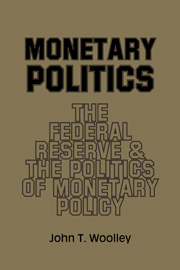Book contents
- Frontmatter
- Contents
- Preface
- 1 The Federal Reserve and the Politics of Monetary Policy: Introduction and Overview
- 2 A Capsule History of the Federal Reserve System
- 3 Recruitment and Selection of Federal Reserve Personnel
- 4 Bankers and the Federal Reserve
- 5 Economists and the Federal Reserve
- 6 The President and the Federal Reserve
- 7 Congress and the Federal Reserve
- 8 Making Monetary Policy in a Political Environment: The Election of 1972
- 9 Monetary Politics: A Summary
- Appendix A A Note on Data Sources
- Appendix B Legislation Included in Table 7.1
- Appendix C Academic Backgrounds and Career Experiences of Notable Monetarists
- Notes
- Bibliographic Note
- Index
5 - Economists and the Federal Reserve
Published online by Cambridge University Press: 01 June 2011
- Frontmatter
- Contents
- Preface
- 1 The Federal Reserve and the Politics of Monetary Policy: Introduction and Overview
- 2 A Capsule History of the Federal Reserve System
- 3 Recruitment and Selection of Federal Reserve Personnel
- 4 Bankers and the Federal Reserve
- 5 Economists and the Federal Reserve
- 6 The President and the Federal Reserve
- 7 Congress and the Federal Reserve
- 8 Making Monetary Policy in a Political Environment: The Election of 1972
- 9 Monetary Politics: A Summary
- Appendix A A Note on Data Sources
- Appendix B Legislation Included in Table 7.1
- Appendix C Academic Backgrounds and Career Experiences of Notable Monetarists
- Notes
- Bibliographic Note
- Index
Summary
Could economists be the Federal Reserve's superiors? Should we imagine economists as effete intellectuals in ivory towers, or as bosses of the Federal Reserve? Many readers will find the former image more likely. I hope to persuade them, however, that there is something to the second image – at least for some groups of economists. The Federal Reserve depends on expertise, and economists are the relevant experts. It is worth at least entertaining the possibility that economists are very important at this institution.
Economists have been closely involved with the Federal Reserve from its founding. The Federal Reserve may be the first instance of the institutionalized application of economic expertise in the service of the government. The contemporary role of economists in monetary policy making is striking as well. We have seen in Chapter 3 that in terms of sheer numbers, economists are prominent at the board. An important prerequisite for participating actively in debates on monetary policy questions is an ability to frame arguments in the appropriate technical language – which is usually the language of economics. This shapes monetary politics both at the level of non-issues and at the level of issues.
Non-issues
Because debate is strongly influenced by mainstream economists who are relatively narrowly specialized in monetary economics, there is a strong tendency for policy debate also to be restricted to narrow technical issues.
- Type
- Chapter
- Information
- Monetary PoliticsThe Federal Reserve and the Politics of Monetary Policy, pp. 88 - 107Publisher: Cambridge University PressPrint publication year: 1984
- 1
- Cited by

